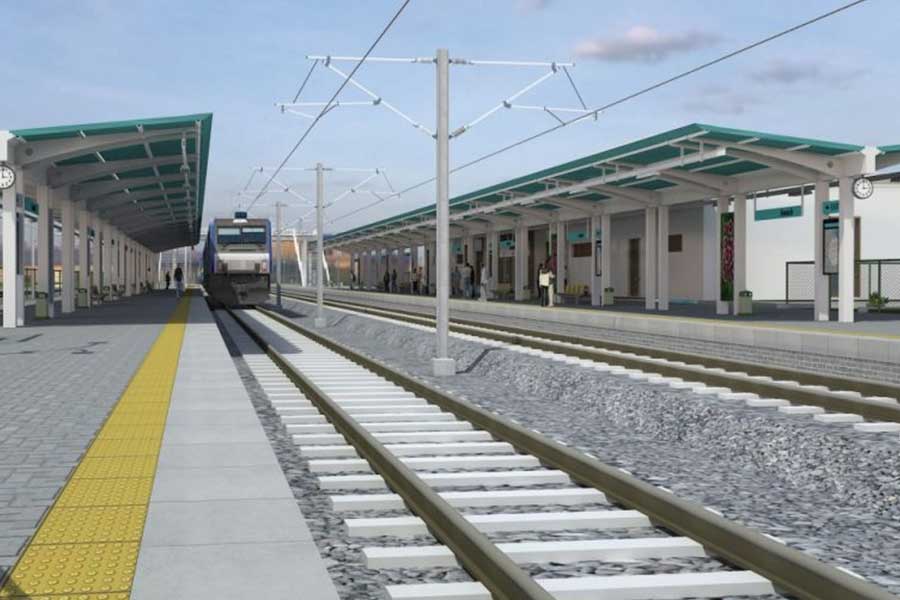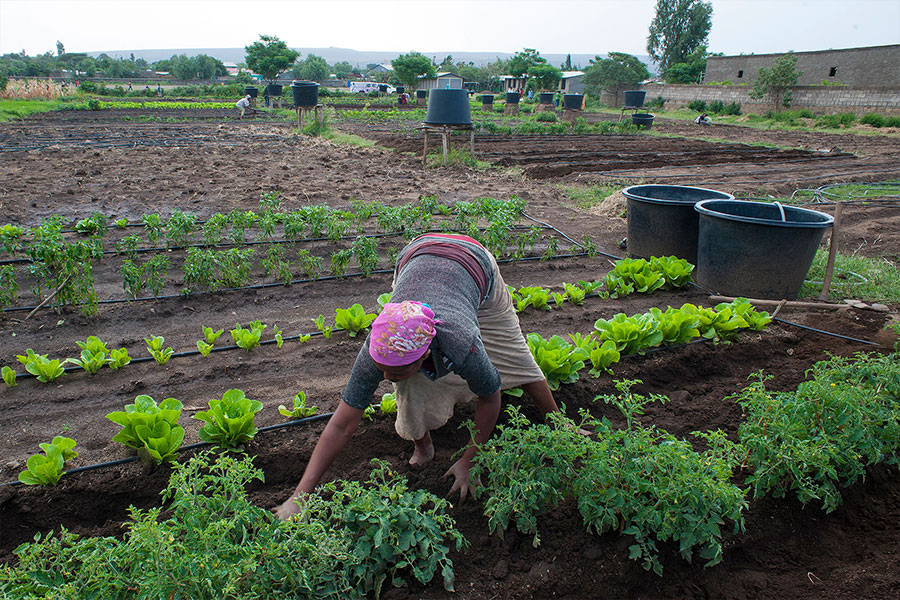
Fortune News | Jul 25,2020
Jan 14 , 2023
By RAHEL BOGALE ( FORTUNE STAFF WRITER )
Nine project sites in the Amhara, Oromia, Sidama, and Southern regional states will be introduced to solar mini-grids and electric irrigation as a pilot program of Distributed Renewable Energy-Agriculture Modality (DREAM) project. It aims to address solar-generated energy for agriculture.
Launched by the Ministry of Water & Energy recently, the project is expected to impact 7,000 people, including 1,545 farmers irrigating 1,215hct of land.
The Ministry plans to roll out the project to more than 100 sites if the pilot program is effective.
According to Mesfin Dabi, head of power development at the Ministry, 90pc of the project aims to provide irrigation service, while the rest plans to provide energy access to households facilitating clean water and streetlights. He added that it would supply reliable and affordable solar mini-grid power to enable large-scale cluster irrigation farms throughout the year.
DREAM project has a 20 million dollar budget, half of which is a loan from the Africa Development Bank and a 40pc grant from the Global Energy Alliance for People & Planet. The private companies participating in the project are expected to cover the rest.
SNV Netherlands Development Organisation manages the project fund, procurement of the power plants, and bids to hire companies installing the mini-grids. The US-based Renewvia Energy has been contracted to undertake the Chefe-Kora, Huluku, Dalle, and Moko sites in Oromia Regional State, while Engie Equatorial from Uganda was awarded the Aregawi, Andega and Telifa sites in Amhara Regional State and RVE.SOL, a company based in Portugal, took the Lelicho and Murchi sites in Sidama and Southern regional states.
The Ethiopian Agricultural Transformation Institute (ATI) is responsible for the irrigation process. According to Yifru Tafesse, deputy director general for ATA, drilling of pilot sites has started except in Amhara Regional State, which is on hold for further hydrological studies.
"It will take three years to be operational," he said.
The project's facilitators hope to replace diesel engine water pumps with solar energy-powered alternatives for irrigation projects reducing the farmers' expenses to buy fuel to operate the water pumps.
For Birhanu Bayesa, a Project Manager for sites in the Oromia Regional State, the project is exhibiting promising results as is at the end of drilling to get underground water.
Farmers at the Dalle site hope to be charged 30 Br for a kilowatt, significantly less than what they were required to pay, 75 Br for one litre of gas, and 400 Br for renting a water pump generator.
Gadisa Megersa, 40, a father of five, grows Teff and vegetables on two hectares of land. He said the unstable weather throughout the year impacted their productivity, with floods washing away the farmlands. They are hopeful the problems will be addressed when the project is complete.
His peer Boka Gudina, 62, is also eagerly waiting to see the project come to life. The father of 13 grows Teff and vegetables on four hectares of land and is struggling to cover living costs.
"Diesel generator has exposed me to high expenses," he said.
According to Boka, the flood during the rainy season and lack of water in the dry season has made his life difficult.
Many projects have failed to meet their objectives when the government is involved, says the independent power consultant Tigabu Atalo. He believes the private sector should take over such projects limiting the government's mandate to regulation.
PUBLISHED ON
Jan 14,2023 [ VOL
23 , NO
1185]

Fortune News | Jul 25,2020

Fortune News | Sep 30,2023

Radar | Aug 17,2019

Radar | Oct 12,2019

Fortune News | Nov 30,2019

Radar | Jul 24,2021

Radar | Sep 17,2022

Fortune News | May 23,2020

Radar | Dec 28,2019

Fortune News | Dec 25,2021

Dec 22 , 2024 . By TIZITA SHEWAFERAW
Charged with transforming colossal state-owned enterprises into modern and competitiv...

Aug 18 , 2024 . By AKSAH ITALO
Although predictable Yonas Zerihun's job in the ride-hailing service is not immune to...

Jul 28 , 2024 . By TIZITA SHEWAFERAW
Unhabitual, perhaps too many, Samuel Gebreyohannes, 38, used to occasionally enjoy a couple of beers at breakfast. However, he recently swit...

Jul 13 , 2024 . By AKSAH ITALO
Investors who rely on tractors, trucks, and field vehicles for commuting, transporting commodities, and f...

Jul 5 , 2025
Six years ago, Ethiopia was the darling of international liberal commentators. A year...

Jun 28 , 2025
Meseret Damtie, the assertive auditor general, has never been shy about naming names...

Jun 21 , 2025
A well-worn adage says, “Budget is not destiny, but it is direction.” Examining t...

Jun 14 , 2025
Yet again, the Horn of Africa is bracing for trouble. A region already frayed by wars...